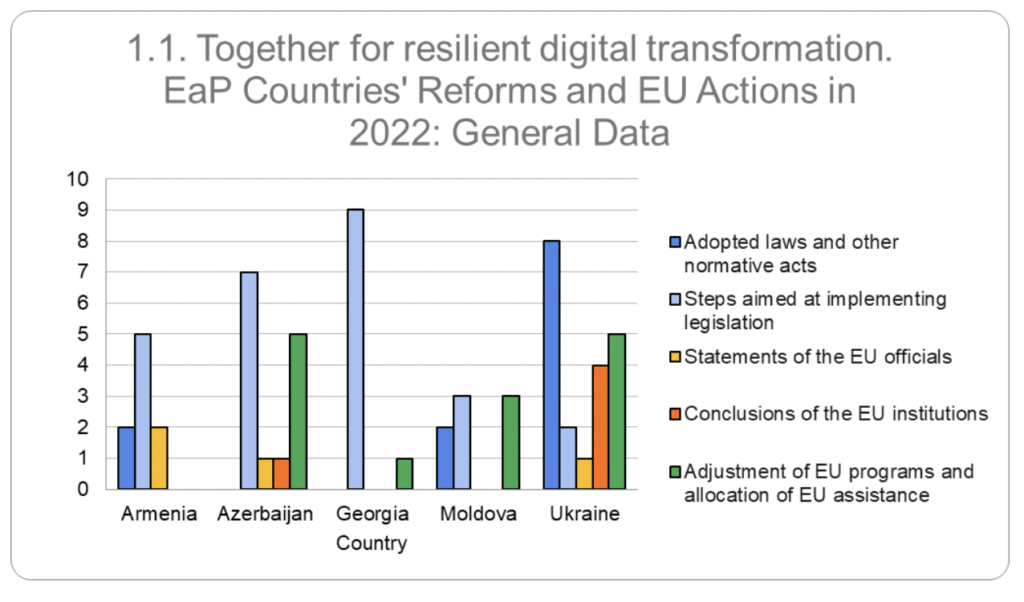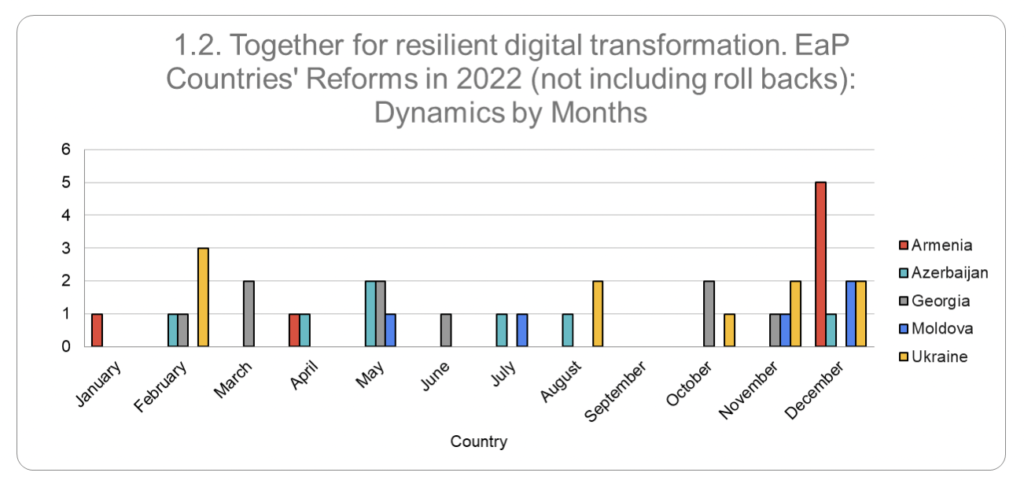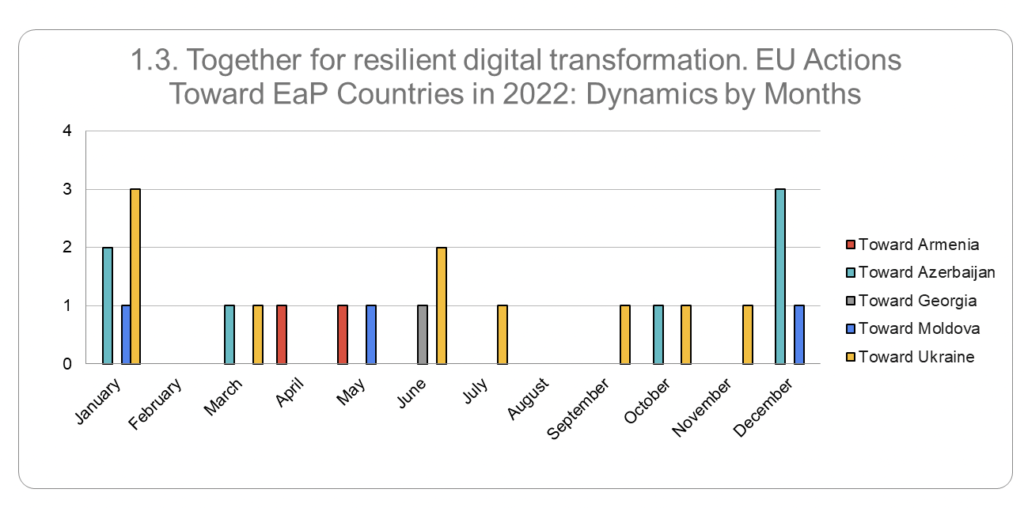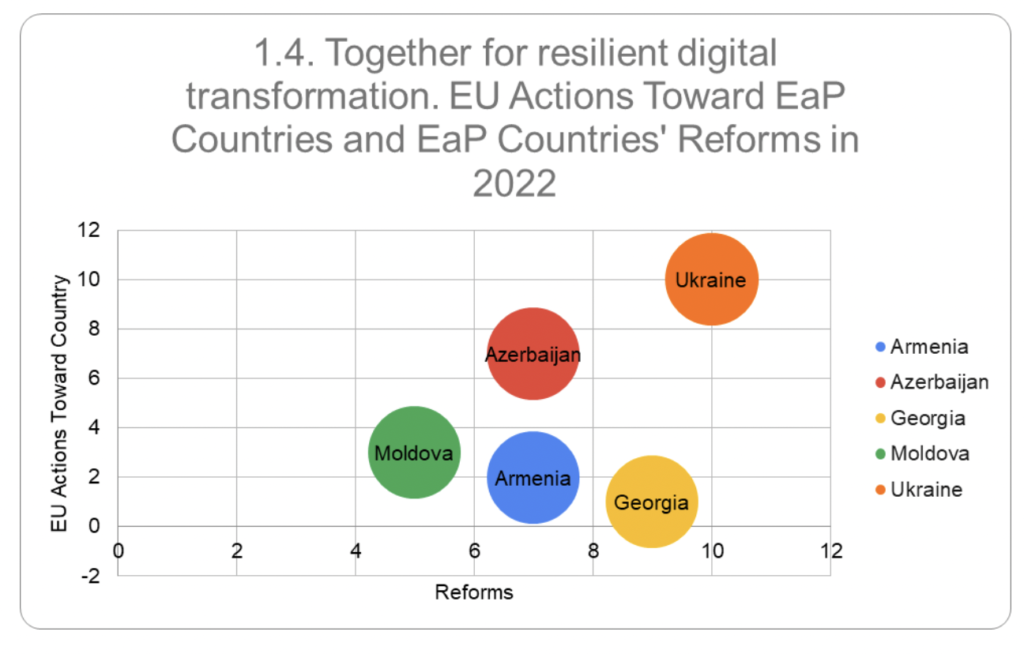The European Union remains a major partner for EaP countries in promoting digital transformation processes. This includes providing financial support for reform implementation through various projects and providing access to EU funding instruments, as well as promoting legislative improvements and innovations in digital sector.
Author: Maksym Koriavets, Civil Society Organization “Polissya Foundation for International
and Regional Studies”
The conclusions presented in the thematic brief are the sole responsibility of the “Ukrainian Prism” team and do not necessarily reflect the views of the EU and partners from the Eastern Partnership countries.
Contributors by gathering data on their countries:
- Sargis Harutyunyan (Media Diversity Institute, Armenia),
- Mariam Paposhvili (Georgian Institute for Strategic Studies),
- Natalia Stercul (Foreign Policy Association of Moldova),
- Nigar Islamli (Center for Economic and Social Development, Azerbaijan)
Introduction
As indicated in the Strategy on Shaping Europe’s digital future, the digital transformation can enable growth and drive sustainable development for both the EU and partner countries. This is why the EU is investing in the digital transformation of the EaP partner countries, in line with EU legislation and best practices, with the aim of extending the benefits of the Digital Single Market to them. This initiative will enable improved access to digital infrastructure and services, enhanced public services and administration for citizens, the expansion of broadband infrastructure, particularly in regional and local areas, and the reinforcement of e-Governance.
Work in this area beyond 2020 will also contribute to the complete implementation of the partner countries’ commitments outlined in the Association Agreements and other bilateral agreements. Work will leverage the achievements of the policy initiative for the Harmonisation of Digital Markets in the EaP and the operational programs established under the EU4Digital brand.
The Joint Staff Working Document “Recovery, resilience and reform: post-2020 Eastern Partnership priorities” identifies four areas of cooperation within the general resilient digital transformation priority, namely:
(1) Digital infrastructure: aimed at closing the digital gap increasing the access to affordable high-speed internet, reducing retail prices for international roaming by applying the Regional Roaming Agreement, securing 5G networks by alignment with the EU approach and freeing frequency bands for mobile operators within Regional Spectrum Agreement;
(2) e-Governance: aimed at making available public services online through interoperable platforms, mutual recognising of digital signatures between the EaP countries and the EU, complementing the TEN-T (Trans-European Network for Transport) network by digital transport corridors across EaP region;
(3) Digital economy and innovation: aimed at increasing cross-border e-commerce with the EU through aligning the e-commerce regulatory frameworks and standards, creating digital education platforms, investing to digital innovation and start-ups, promoting free and open space-based data and services;
(4) Cyber resilience – Cybersecurity: intended to put in place institutional, policy and legislative cybersecurity frameworks in all the EaP countries in line with the EU legislation and guidelines, introduce the ENISA’s cyber threat landscape methodology in all the EaP countries, promote further alignment with EU and international data protection standards.
To make a meaningful difference to individuals and businesses in the Eastern Partnership region, and to maximize the impact and visibility of digital transformation efforts, the Economic Investment Plan proposes specific country flagship initiatives for digital development in each partner country. These initiatives highlight the priority steps needed to achieve a resilient and effective digital transformation within each country.
Digital flagship Initiatives for Armenia provide for investing in digital transformation, innovation, science, and technology.
Azerbaijan’s priority digital transformation projects are expected to be implemented in the field of digital connectivity: supporting the digital transport corridors.
Priority steps for the Republic of Moldova are also aiming at improving connectivity by anchoring Moldova in the TEN-T network.
Digital flagship Initiatives for Georgia suggest developing high-speed broadband infrastructure for rural settlements.
The Ukrainian flagship agenda primarily focuses on accelerating digital transformation through the modernization of public IT infrastructure.
Flagship initiatives for Belarus are tentative at the moment and will totally depend on democratic transition processes inside the county. In Economic Investment Plan’s context, it was expected to boost innovation and the digital transformation in the country.
Methodology
This thematic brief is the second instalment in a series of studies conducted by the team of the project “Civic EaP Tracker: Monitoring EaP targets, deliverables and related reforms”, dedicated to the involvement of the EU in transformations in the countries of the Eastern Partnership.
The research group aims to examine various aspects of the situation in the countries and the reforms the EU actors in the target countries paid attention to, how they adapted their actions in this context to the new political, social, economic and security circumstances, as well as how consistent the countries were in implementing reforms in response to Brussels’ reactions.
For this purpose, data were collected on statements by European officials, official conclusions regarding the implementation of policies by EU institutions, and changed or newly established support mechanisms (programs, projects, and funds), the addressees of which were partner countries. Information was also collected on the laws and other legal acts adopted in the Eastern Partnership states and steps in their implementation related to the priorities of the “Joint Staff Working Document – Recovery, resilience and reform: post 2020 Eastern Partnership priorities”. The analysis covered all the significant events of 2022 in this context.
The study has a common framework for Armenia, Azerbaijan, Georgia, Moldova and Ukraine. Due to the de facto termination of the participation of Belarus (captured by a self-proclaimed authoritarian regime) as a state in the Eastern Partnership, the study will present a separate perspective of independent Belarusian civil society on the topic.
This thematic brief is devoted to the processes in the area of priority “Together for resilient digital transformation”. Accordingly, all the analysed information about the actions of the EU and reforms in the partner countries was related to the issues of this chapter of the Joint Staff Working Document.
Main trends in digital transformation field of the Eastern Partnership region
The European Union remains a major partner for EaP countries in promoting digital transformation processes. This includes providing financial support for reform implementation through various projects and providing access to EU funding instruments, as well as promoting legislative improvements and innovations in digital sector.

The responses of the Eastern Partnership countries to the support tools proposed by the EU in the field of digital transformation vary from country to country and from sector to sector.

To a large extent, this is caused by the diversity of the political situation in each of the Eastern Partnership countries and modern geopolitical challenges in the region.
Ukraine shows the greatest activity in this context, especially when it comes to cybersecurity, e-Governance / public e-services, electronic communications, e-Trust and electronic identification spheres. Ukraine has the highest indicator regarding adopted laws and normative acts in terms of implementing EU digital agenda. In response to Ukraine’s requests, the EU engages the country’s institutions in various joint projects (experimental project on mutual recognition of electronic trust services; participation of Ukraine in the European Union program “Digital Europe”; financial support of Ukrainian cybersecurity infrastructure; etc). Granting the EU candidate status to Ukraine plays a significant role in this.
Moldova and Georgia also demonstrate significant levels of cooperation with the EU, which is evident through various practical joint projects aimed at making concrete steps within EU4Digital agenda, e.g. the e-Delivery pilot project between the Republic of Moldova and Ukraine, testing the technical interoperability of cross-border eSignature between Armenia, Georgia, Ukraine and Estonia.
It should be noted, that EU candidate status of Moldova also enables the government to adopt important legislative acts in digital field aligned with EU requirements/recommendations (new laws on e-signature and copyrights). Furthermore, the EU supports the digital infrastructure of the country.
EU digital aspirations of Georgia, Armenia, Azerbaijan are mostly represented by steps aimed at implementing national legislation in different digital spheres (Georgia – e-Government & cybersecurity, Armenia – electronic identification & cybersecurity, Azerbaijan – e-Government & electronic identification & cybersecurity). EU4Digital Facility (Phase II) remains the main channel of EU influence in these three countries.
As mentioned previously, the intensity of digital transformation processes and the actions taken by the EU vary among the Eastern Partnership countries.

Throughout 2022, the European Union placed significant emphasis on the advancement of Armenia’s digital economy and infrastructure. Although specific details may be limited, general statements indicate the EU’s commitment to continue collaborating closely with Armenia to bolster the country’s digital transition.
In Armenia, the primary focus was on information systems management, implementing digital solutions within the country’s governance system, and enhancing cybersecurity systems.
Consequently, the Information Systems Management Council and the Information Systems Agency of Armenia Foundation were established. These institutions have been created with the aim of facilitating the development of a digital society, fostering the growth of the country’s digital economy, and enhancing the capabilities of the cybersecurity system.
Visible steps were made in digitalization of public services. For this purpose, Standards and the Digitalization Guide to streamline the creation of digital public services were developed and National Identification Portal has been designed to make it possible to provide digital services with high security and unified digital identification solutions.
On the other hand, after the Russian invasion to Ukraine Armenia also became one of the countries facing Russian cyber threats. Considering this, relevant Armenia’s governmental bodies are concluding, that it is necessary to deepen cooperation with the EU in the cyber security sphere. That’s why the work towards creation of CERT (Computer Emergency Response Team) at the national level has been initiated with the aim of building adequate capacity and ensuring the implementation of relevant strategies. And, according to the Ministry of High-Tech Industry, up-to-date legislation in the field of digital governance, data policy and cyber security is being elaborated. The latter is of special importance from the perspective of strengthening Armenia’s security. It can also become the sphere where Yerevan and Brussels can move to a new quality of cooperation by tackling cyber security and defence issues.
EU’s actions toward Azerbaijan were mainly directed to telecommunication and start-up ecosystem, and this is evidenced by the amount of respective funding (in 2022, the European Bank for Reconstruction and Development provided a loan of up to $50 million to Aztelekom to finance the rollout of state-of-the-art broadband infrastructure to more than 280,000 households in the regions of Azerbaijan). Both the planned and current financial support initiatives are strategically designed to facilitate long-term achievements.
EU4Digital Facility paid significant attention to start-up ecosystem organisations and innovation experts in Azerbaijan during 2022 that was accompanied by launching the start-up ecosystem platform for the Eastern partner countries.
Meanwhile, digitalization of public services and telecommunications remain priority areas in Azerbaijan. In February 2022, a cloud-based new generation digital signature “SIMA” was elaborated within the public-private partnership scheme. Later in 2022 Unified Electronic Services Portal was put into use to make it possible obtaining public electronic services from the institutions included in the structure of the Ministry of Digital Development and Transport through a single system.
In addition, the “Agent banking” project was implemented in Azerbaijan to increase the accessibility of financial services for all citizens of the country.
In light of Russian aggression, Azerbaijan also took significant steps to address the issue of cybersecurity during 2022. One notable development was the establishment of the Association of Cybersecurity Organizations of Azerbaijan.
The EU’s projects on digitalization of the Republic of Moldova were mainly focused on ensuring the access to adequate digital infrastructure for schools and rural areas, creating possibilities for studying for students of the relevant faculties to acquire and develop digital skills essential for their future, as well as supporting start-ups related to the IT domain. The EU has also paid increased attention to cyber-security area, especially in the context of high vulnerabilities created by the Russian war against Ukraine. Moreover, cybersecurity is an extremely sensitive topic, especially given the regional security realities, and therefore the government needs to make sure that digital transformation systems are highly efficient and resilient.
The Republic of Moldova started to pay more attention to the digitalization of its economy and public services compared to the previous years. The significance attached to these reforms is evident from the establishment of a dedicated Ministry for Digitalization. Moreover, public governmental services became more accessible on online platforms (the platforms developed by e-Governance Agency gives access to more than 80 e-Services).
The activity of several IT parks and hubs in Moldova, such as Tekwill, Endava, Mediapark, Amdaris, etc. demonstrates how the IT sphere has become one of the most important one for the development of Moldovan economy.
The increasing interest among young people in developing their digital skills has prompted the Moldovan Government to launch new bachelor programs at select universities. These programs focus on the “professions of the future,” including media production, game design, and animation, providing opportunities for students to acquire relevant expertise.
The government needs to focus more on the creation of a digital society by ensuring digital education as a national educational priority, developing simple solutions, so that they are used by as many citizens as possible, of national digital education programs for all ages, sectors and professions, the involvement of everyone in their development and use (including the diaspora), a broad participation of local public authorities in this complex process, research, etc.
Significant attention in Georgia’s digital policy during 2022 was paid to cyber security and e-Governance issues.
Throughout 2022, several cyber security educational and networking initiatives were conducted: “Cyber Winter” educational program of Digital Governance Agency and national Computer Emergency Response Team; events to strengthen the cooperation between private and public sectors in the field of cybersecurity; launching the work on the strategy for raising awareness of cybersecurity; cybersecurity trainings for employees of Digital Governance Agency, etc.
The Program aimed at implementation of Georgian Cybersecurity Strategy and Action Plan was also launched by Digital Governance Agency with support of the UK and Northern Ireland.
The e-Governance sector in Georgia witnessed a significant milestone with the creation of my.gov.ge, a platform that enables online access to state services. However, it is important to continue the process of designing or redesigning services and ensure the full integration of a feedback mechanism.
Developing the access to the Internet across the country is crucial in terms of supporting the development the e-Governance sector, therefore pro-EU aspirations of Georgia were always linked to developing high-speed broadband infrastructure for rural settlements. Regrettably, smaller towns and villages often lack easy access to high-speed internet services.
Access to public e-services offered on digital portals is hindered by both insufficient internet and computer proficiency. Many individuals face challenges in utilizing these services due to limited knowledge and skills in using digital technologies. Furthermore, a significant portion of the population remains unaware of the services that can be accessed from the comfort of their homes, without incurring additional costs or time commitments.
It should be also noted, that standardized procedures for administering services have not been established yet, and legislative amendments are being made in this regard. Public entities, especially in municipalities, are not showing sufficient initiative in providing all services digitally, and there is no mechanism for mandating administrative bodies to do so.
That is why the Digital Georgia strategy needs to be updated, and agencies should develop their action plans accordingly.
The European Union pays considerable attention and support to the processes of digital transformation in Ukraine and highly appreciates Ukraine’s achievements in this direction.
This is confirmed by the annual report on Association Agreement implementation in Ukraine, as well as by:
– Signing of the Agreement between Ukraine and the European Union on the participation of Ukraine in the European Union program “Digital Europe” (2021-2027);
– Invitation and acceptance of Ukraine to large-scale networks of digital direction (European Blockchain Partnership, Body of European Regulators for Electronic Communications, European network of ICT SMEs).
In the context of financial and technical support in 2022, the greatest attention from the EU side was paid to the cybersecurity, e-Logistics (e-Delivery), e-Trust (eSignature) spheres.
The main legislative steps of the Ukrainian government in digital transformation sphere during 2022 were made in terms of electronic trust services, electronic identification, providing electronic public services in automatic mode, as well as regulating cloud services’ and virtual assets’ fields. Significant progress was caused due to the military situation in Ukraine: using personal data and electronic documents from the “Diya” Portal abroad (including EU countries) was allowed to receive public services outside of Ukraine. As a result of these joint efforts: Ukraine took 2nd place in the Open Data Maturity 2022 rating among 35 countries. The maturity level of open data in Ukraine was 97% as of 2022. The average figure in Europe is 82%.
Bearing in mind intense geopolitical conflict (Ukrainian – Russian war) the EU recognizes the necessity of rapid responses to cyber threats and makes important steps to support Ukraine in fighting against potential Russian cyber-attacks. The significance of the challenges in cybersecurity is evident through the actions taken by the EU, such as the deployment of Cyber Rapid Response Teams and the provision of over €10 million in support to enhance cybersecurity and ensure the availability of public services in Ukraine (“EU Support to Strengthen Cyber Security in Ukraine” project provides assistance to address cybersecurity and data security needs in three main areas: “Trembita” secure data exchange platform and the management of public registries; protection of critical infrastructure and public data; security tools to enable operational staff to maintain critical public infrastructure).
Conclusions and recommendations
The diversity of the political situation in each of the Eastern Partnership countries and modern geopolitical challenges in the region create different conditions for implementing digital transformation reforms and using the respective possibilities proposed by the EU. And vice versa – the EU proposes different support mechanisms (programs, projects and funds) to the EaP countries depending on their situation, political will and existing urgent needs.
A prime example of such diversification is Ukraine which received rapid EU support to strengthen cybersecurity system for fighting against potential Russian cyber-attacks. On the other hand, effective actions of the Ministry of Digital Transformation of Ukraine in developing the system for providing electronic public services (via “Diya” platform) contributed to attracting significant attention from the EU support programs.
The Georgian government is prioritising high-speed broadband internet services in rural areas and securing private investment in telecommunications. The country has already made great progress towards harmonisation with the EU legislative and policy framework in this field, and is very actively engaged in the EU4Digital Initiative in this regard.
Azerbaijan is geographically positioned between multiple regions “on the crossroads of international trade”. Thus, country considers the benefits of creating and strengthening cross-border telecommunication links, solutions for e-Trade facilitation and digital transport corridors, smart cities and villages.
Armenia is prioritising the interoperability of data for citizens and businesses (creating information systems), to make sure that different public agencies avoid repeating the collection of information. The country has tested how to recognise EU and Armenian e-signatures to facilitate smoother digital economy processes with unified digital identification solutions.
With the assistance of EU4Digital, Moldova has been actively engaged in the digitalization and streamlining of customs services. The aim is to facilitate more efficient checks at border crossing points. This initiative aligns with Moldova’s political will to enhance compatibility with the EU as a commercial partner.

Despite facing internal and external challenges, it is crucial for the Eastern Partnership region to prioritize digital transformation as a principal component of its efforts towards recovery, resilience, and reforms.
Such tools as EU4Digital Facility help to create a common frame for extending the benefits of the Digital Single Market to the Eastern partner countries, but each partner country together with respective EU institutions should pay more attention to additional instruments for avoiding/eliminating further disparities inside the Eastern Partnership region in terms of the level of political commitment and intensity of internal activities on the way to resilient digital transformation.
Considering the findings and trends of 2022, the following recommendations can be offered to EaP governments and relevant EU actors:
- To continue lobbying and promotion of signing Regional Roaming Agreement as well as Regional Spectrum Agreement among the EaP countries. Some of the EaP countries still haven’t demonstrated significant practical progress neither in adopting important program documents nor in the context of cooperation with the EU in developing common telecom infrastructure.
- To introduce holistic region-wide monitoring system for measuring digital skills and competences across the EaP region. In the Eastern partner countries, the strategic documents recognise digital skills competences, capacities and capabilities as a priority. However, there is an uneven capacity to measure what it means to be digitally empowered – reaching the ambitious target of 1 million upskilled citizens in the EaP will require creating measuring and monitoring tools.
- To conduct a comprehensive study on existing cyber security gaps in the EaP countries and to elaborate rapid eliminating mechanisms for addressing the existing problems, involving the networks of different countries’ cyber security experts. When it comes to cybersecurity challenges in the Eastern partner countries, it is essential to articulate the differences between the countries. Simultaneously, it is important to acknowledge that many of the threats faced in the Eastern Partnership (EaP) region and the EU are similar in nature and can be effectively addressed through collaborative efforts.
- To develop and implement a monitoring system for annual measuring of the level of achievement of post-2020 priorities proposed by Joint Staff Working Document “Recovery, Resilience and Reform: Post-2020 Eastern Partnership Priorities” in digital transformation sector. This instrument could prove beneficial in mitigating and preventing further disparities within the Eastern Partnership region concerning the level of political commitment and the intensity ofsc internal activities towards achieving resilient digital transformation.
This publication was produced with the financial support of the European Union. Its contents are the sole responsibility of the Foreign Policy Council “Ukrainian Prism” and do not necessarily reflect the views of the European Union
The project benefits from support through the EaP Civil Society Forum Re-granting Scheme (FSTP) to Members and is funded by the European Union as part of its support to civil society in the region. Within its Re-granting Scheme, the Eastern Partnership Civil Society Forum (EaP CSF) supports projects of its members that contribute to achieving the mission and objectives of the Forum.
Grants are available for CSOs from the Eastern Partnership and EU countries. Key areas of support are democracy and human rights, economic integration, environment and energy, contacts between people, social and labour policies.


